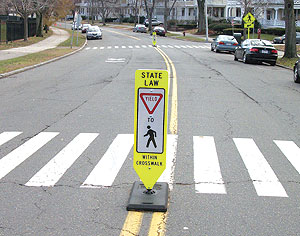
An advisory panel has been established that will study ways of improving how we travel through the city.– Photo by Bobbie Toner
By Cathleen Twardzik
Mayor Curtatone has formed a transportation research, innovation and planning (TRIP) team to advise the city about new technology and procedures, which will be intended to increase capacity, accessibility, convenience and safety of each mode of local transportation.
The advisory panel, which was begun in March 2012, is comprised of representatives, all of which were found in residential community and business community in Somerville. The team also includes transportation and parking policy experts.
Along with city officials, all of whom will supply support, the TRIP team will have a broad mandate to evaluate best practices and emergent technology, which will include: pedestrian improvements, new transportation technology, transit access and promotion, traffic calming strategies, bicycle safety, parking permits, parking configurations, payment systems and consumer services.
Members of the TRIP team include: Tony LaFuente, Ward 4 Alderman, Rebekah Gewirtz, Ward 6 Alderman, Mimi Graney, Executive Director of Union Square Main Streets, Carrie Dancey, Executive Director of East Somerville Main Streets, Lieutenant James Polito, Traffic Enforcement Unit of the Somerville Police Department, Joe Lynch, Founder, Magoun Square Neighborhood Association, Alyssa Rosen of the Young Somerville Advisory Group, Tim Talun of the Somerville Bicycle Committee, Ian Judge, Manager, Somerville Theatre, Gregory Coughlin, Owner, Olde Magoun Saloon, Mark Chase, Transportation and Planning Consultant, Courtney Koslow, Founder, Somerville Parking Advocacy and Reform Coalition and Todd Easton, Independent Travel Consultant.
“Over the past two years, Traffic and Parking has made tremendous progress in improving parking procedures, services and technologies, and we’ve continued to advance the expansion of bike lanes, bike sharrows and locations for bike corrals, as well as easier and more convenient parking permits and payment options at parking meters throughout Somerville. But with the Hubway bike rental kiosks coming to town this spring, with construction about to begin at Assembly Square on the Orange Line station, with design moving ahead on the Green Line Extension, and with some of Somerville’s MBTA bus service still threatened by future service cuts, it’s time to take a fresh look at our various transportation systems,” said Mayor Curtatone.
Parking regulations were “reformed” in 2009. “This time, the mayor wants to cast the net more widely and embrace modes and technologies that contribute to the convenience and mobility of Somerville residents, visitors and businesses. The TRIP team will research, analyze and then advise us, on the applicability and cost-effectiveness of any and all technologies, relating to all of our transportation modes,” said Matthew Dias, Acting Director of Traffic and Parking.
Within smaller working groups, The TRIP team is spread among four dissimilar topics. Transit will involve transit options, which include alternative transit and non-traditional modes and improvements for populations with special needs. Next, parking will include parking policies and parking demands and capacity. A third issue with which the team will deal involves pedestrian and accessibility to create a more satisfying pedestrian experience in Somerville, as well as to address accessibility concerns. Lastly, Traffic Management & Roads will improve flow, way-finding and safety on public ways for motor vehicles and bicycles.
Copious issues will be analyzed. At present, the TRIP team is collaborating with city staff to delve into three specific questions, which arose during its initial two meetings.
The first query is, “Are ‘all-way’ pedestrian crossing signals inefficient?” according to Thomas P. Champion, Executive Director of Communications and Cable of the City of Somerville and one of the city staffers assigned to work with the TRIP team. He has attended each TRIP team discussion. It must be noted that this first question also ponders the issue of whether alternating pedestrian walk signs with additional timing adjustments would assist pedestrians and motorists to navigate more safely, as well as effectively.
Secondly, “Should the city develop a pilot program to develop and promote alternative ‘neighbor-way’ routes from between squares that offer quieter, less-congested streets for pedestrian and bicycle traffic, thereby [reducing] bicycle-motor vehicle interaction on arterial roads? The pilot might involve specialized way-finding signage that not only [provides] directions, but [informs] pedestrians and cyclists about actual distances and approximate travel times,” said Champion.
To round out the questions, the team is considering getting the city to create a pilot program that would unpave the street in no-parking zones, which abut fire hydrants. The reason is that the unpaved sections would not “impede access [to] fire vehicles, but they could potentially reduce runoff and flooding.” Simultaneously, the appearance of the urban streetscape would be enhanced.
“The Mayor’s charge to the TRIP team is to ‘be abnormal.’ In other words. to be as open, creative and innovative as possible,” he said.
“For that reason, its recommendations won’t generally [be] discussed publicly until after they have been reviewed by the mayor. This list is simply to provide a sample of the types and range of the ideas the TRIP team will explore in the months to come. It’s early days yet, but it’s been encouraging to see the levels of creativity, enthusiasm and cooperation that the membership of this informal advisory group has brought to the table,” said Champion.
“The SomerVision comprehensive plan and our Happiness Survey both confirm that residents and businesses are strongly committed to the idea of Somerville as a truly multimodal community. We want to make sure Somerville continues to maintain best practices and the intelligent use of technology in transportation, in much the same way as we have in administration, finance and communications. I’ve been telling leaders at the state level that the commonwealth needs a 21st century transportation system to support a 21st century economy, and I think we should be applying that principle at the local level, too. This group will help us do just that,” said Curtatone.















Reader Comments